Sep 6, 2022
Chile Stuns With a Full Percentage Point Interest-Rate Hike
, Bloomberg News

(Bloomberg) -- Chile’s central bank stunned investors by delivering a bigger-than-expected interest rate hike of 100 basis points to combat rising inflation forecasts while also signaling that the end to its bold tightening cycle is near.
The bank board, led by Rosanna Costa, lifted borrowing costs to 10.75% late on Tuesday, surprising all economists in a Bloomberg survey who had forecast a boost of no more than 75 basis points. It was a rare split decision, as one member voted for a 125 basis-point hike, and another for a rise of 75 points.
In an accompanying statement, policy makers wrote the key rate now stands at “the maximum level considered in the central scenario of the September Monetary Policy Report,” which will be published Wednesday.
“Future movements of the policy rate will depend on the evolution of the macroeconomic scenario and its implications for the convergence of inflation to the target,” they wrote. “The Board will be especially vigilant of the upward risks for inflation, not only because of the high level it has reached but because inflation expectations two years ahead remain above 3%.”
Policy makers jolted efforts to damp inflation that likely approached 14% in August, propelled by a series of shocks including soaring commodity costs and a weak peso. The currency is still down about 9% since March, even after the central bank announced a $25 billion intervention program to prop it up and agreed to new credit line with the International Monetary Fund.
What Bloomberg Economics Says
“The bigger than expected hike and less hawkish forward guidance is consistent with policy makers front-loading their estimate of the necessary adjustment. Forward guidance suggests this could be the end of the tightening cycle if new inflation data is in line with central bank projections. It keeps the door open for more hikes if there are any surprises.”
--Felipe Hernandez, Latin America economist
Click here for full report
Prices continue to rise even after the economy narrowly dodged a recession, with output stagnating in the second quarter and contracting in the first three months of the year. Retail sales tumbled 10.9% in July from the year earlier.
Policy makers wrote that the global cost of living has continued to rise and shows signs of greater persistence. Locally, consumer prices climbed more than expected in July, and market inflation expectations are on the rise.
Indeed, traders see inflation of 5.25% in two year’s time, according to a survey published Sept. 1, up from the 4.75% predicted at the end of July. That’s well above the 3% target.
“The board struck a hawkish tone,” said Sergio Godoy, chief economist at STF Capital. “A hike of 50 or 75 basis points is probable at the October meeting, and we don’t rule out further increases.”
Chile’s rate decision follows a hawkish message from Brazil’s central bank reminding investors it is weighing more monetary tightening this month. Meanwhile, officials from the US Federal Reserve have signaled they will keep policy tight as they fight the hottest inflation in roughly four decades.
Easing Tensions
Still, in their statement, Chile central bank board members wrote the labor market has lost strength, with low job creation and a drop in openings. Consumer and business confidence measures point to pessimism, they wrote.
“In their outlook the bank doesn’t plan for a key rate that’s significantly above its current level,” said Nathan Pincheira, chief economist at Fynsa. “This level of borrowing costs will be kept through at least the first quarter of 2023.”
Board members wrote that tensions in the foreign exchange market have eased and volatility has decreased since their intervention announcement in July. Long-term interest rates are at roughly similar levels compared to the previous policy meeting, they wrote.
Meanwhile, on Sunday, Chileans rejected a new constitution, keeping in place the current, more market-friendly basic laws. While uncertainty will run high in the short-term as President Gabriel Boric’s administration weighs another rewrite of the charter, some analysts have said the outlook will improve.
“The central bank gave a signal that this could be the last rate increase as long as there’s no surprise in inflation,” said Sebastian Diaz, an economist at Pacifico Research.
(Recasts story, adds analyst comment starting in fourth paragraph)
©2022 Bloomberg L.P.







